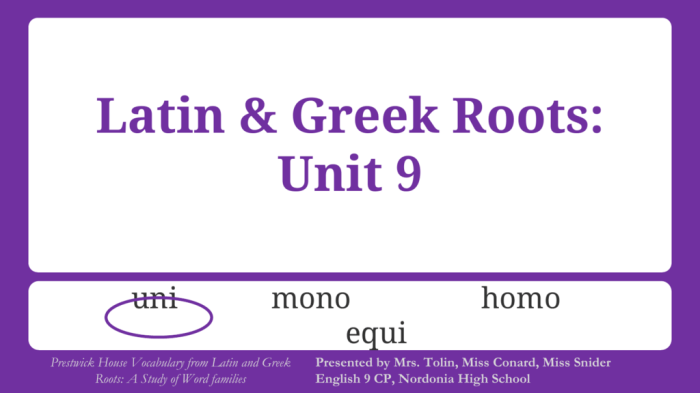Vocabulary from latin and greek roots answer key – Embarking on an etymological journey, this exploration of vocabulary from Latin and Greek roots unveils the profound influence these ancient languages have had on the development of English. By examining the historical origins, diverse types, and practical applications of these roots, we gain a deeper understanding of the intricate tapestry of our language.
Delving into the historical origins of Latin and Greek roots, we discover their profound impact on the evolution of English vocabulary. From prefixes and suffixes to base roots, these linguistic building blocks have shaped the very fabric of our language, providing insights into the interconnectedness of languages and cultures.
Etymology of Latin and Greek Roots
Latin and Greek roots are the building blocks of many English words. They provide a deeper understanding of the language’s history and structure. The historical origins of Latin and Greek roots can be traced back to the ancient civilizations of Rome and Greece, respectively.
Latin was the official language of the Roman Empire, which spanned much of Europe, North Africa, and the Middle East. Greek was the language of the ancient Greek civilization, which flourished in the eastern Mediterranean region. Both languages have had a profound impact on the development of Western civilization, including the English language.
Here are some examples of words with Latin and Greek roots:
- Latin: “aqua” (water) -> “aquatic,” “aquarium”
- Greek: “logos” (word) -> “logic,” “dialogue”
Types of Latin and Greek Roots
There are different types of Latin and Greek roots, including prefixes, suffixes, and base roots.
Prefixesare added to the beginning of a word to change its meaning. For example, the prefix “anti-” means “against,” as in the word “antibiotic.” Suffixesare added to the end of a word to change its part of speech or meaning.
For example, the suffix “-tion” means “the act or process of,” as in the word “education.”
Base rootsare the core of a word and carry the main meaning. For example, the base root “scrib” means “to write,” as in the words “scribe” and “script.”
The following table provides examples of each type of root:
| Type | Example | Meaning |
|---|---|---|
| Prefix | anti- | against |
| Suffix | -tion | the act or process of |
| Base Root | scrib | to write |
Impact on English Vocabulary

Latin and Greek roots have had a significant impact on the development of English vocabulary. Over half of English words are derived from Latin or Greek roots. This influence can be seen in many areas of the English language, including:
- Academic vocabulary:Many academic words, such as “science,” “philosophy,” and “mathematics,” have Latin or Greek roots.
- Medical vocabulary:Many medical terms, such as “anatomy,” “physiology,” and “pathology,” have Greek roots.
- Legal vocabulary:Many legal terms, such as “contract,” “tort,” and “statute,” have Latin roots.
Strategies for Building Vocabulary

There are several effective strategies for building vocabulary through the study of Latin and Greek roots. One strategy is to use a dictionary to look up unfamiliar words and identify their roots. Another strategy is to use flashcards to practice memorizing roots and their meanings.
Here are some additional tips for building vocabulary:
- Read widely and pay attention to unfamiliar words.
- Use a dictionary or thesaurus to look up unfamiliar words.
- Practice using new words in your writing and speaking.
Applications in Various Fields
Latin and Greek roots have practical applications in a variety of fields, including:
- Medicine:Medical professionals use Latin and Greek roots to understand specialized terminology, such as “cardiovascular” (heart and blood vessels) and “gastrointestinal” (stomach and intestines).
- Law:Legal professionals use Latin and Greek roots to understand legal terminology, such as “habeas corpus” (you should have the body) and “ex post facto” (after the fact).
- Science:Scientists use Latin and Greek roots to understand scientific terminology, such as “photosynthesis” (light synthesis) and “biosphere” (life sphere).
Questions Often Asked: Vocabulary From Latin And Greek Roots Answer Key
What are the benefits of studying Latin and Greek roots?
Studying Latin and Greek roots enhances vocabulary, improves reading comprehension, facilitates language learning, and provides a deeper understanding of English etymology.
How can I identify Latin and Greek roots in English words?
Look for prefixes, suffixes, and base roots that resemble Latin or Greek words. Use dictionaries or online resources to confirm your findings.
What are some examples of Latin and Greek roots in English?
Examples include “bio” (life), “geo” (earth), “chron” (time), and “log” (word).